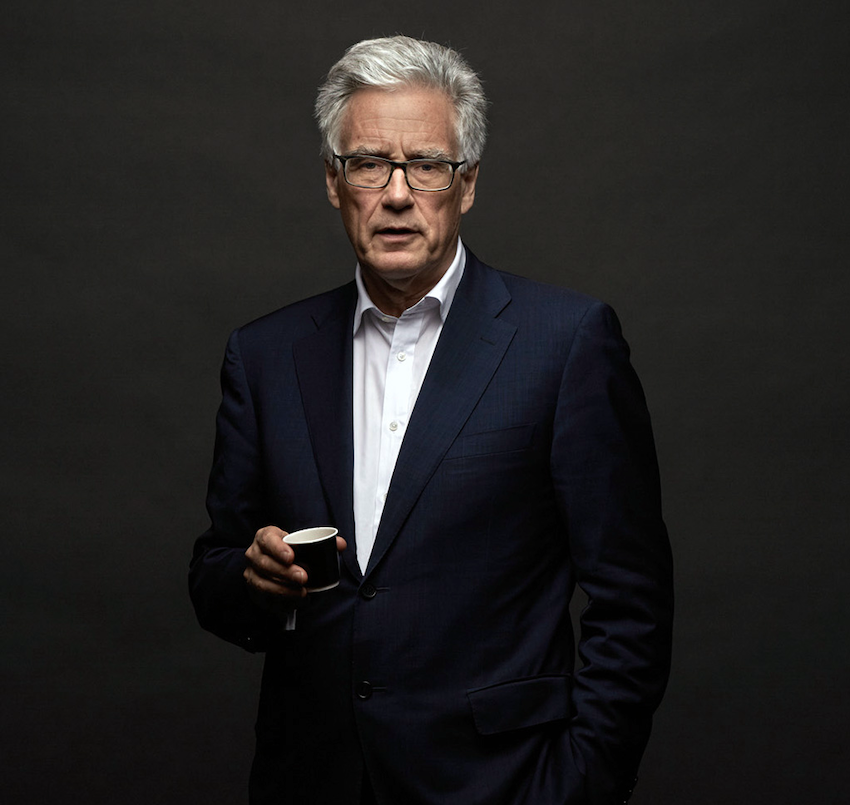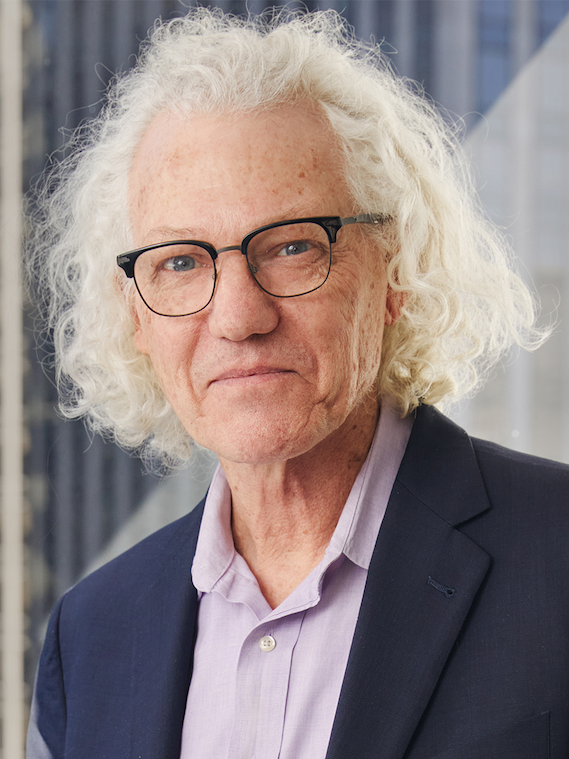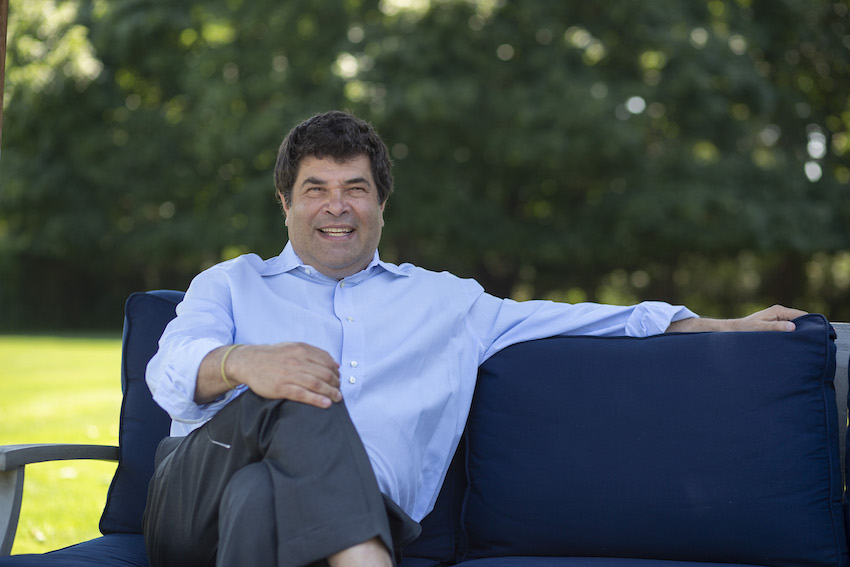He helped lead the UK out of the 2008 financial crisis and is now Chair of the Energy Transitions Commission and OakNorth Bank. By Brunswick’s Oscar Elmon and Carlton Wilkinson.
Economist Lord Adair Turner was appointed Chair of the Financial Services Authority in 2008, just six days after the collapse of Lehman Brothers—the initial failure in a cascade that shook the global economy.
“I sometimes describe it as being appointed captain of the Titanic after you’ve hit the iceberg, but before you’ve actually sunk,” he told us in a recent interview. In the ensuing months and years, the FSA stabilized the financial sector and led the UK economy out of the crisis, setting up structures that remain in place today to make another such catastrophe less likely, and to hold those responsible to account.
“I feel pretty good, touch wood, that we made a set of very robust reforms,” Lord Turner says.
The skills demanded by that assignment have served him well since. He is currently Chair of the Energy Transitions Commission, a global coalition of major power and industrial companies, investors, environmental NGOs and experts working on pathways to limit global warming to well below 2˚C while stimulating economic development. In the private sector, he is Chair of OakNorth, a fast-growing digital bank and one of the most successful neobanks in the UK, and Non-Executive Chairman of insurance group Chubb Europe. Appointed to the House of Lords in 2005, he is a crossbench member (unaligned with a political party). He’s also an angel investor in new technologies, including in the food and energy sectors, and the author of three books on economic policy.
As a university student, Lord Turner already knew he wanted to be engaged in shaping public policy. But after early involvement in politics on and off campus, “I came to realize that I’m not good at staying in any one political party,” he says. “I don’t at all disparage that, but I realized that’s not for me.”
He found himself instead at British Petroleum, then at Chase Manhattan Bank for almost three years before joining McKinsey in 1982. There, in the 1990s after a few years as a corporate advisor, he signed onto a team helping Eastern European institutions turn previously managed economies into capitalist ones. The experience was “a bridge away from the usual consulting work,” he says, and led him to a Blair government position in the 2000s, where he helped create a set of permanent pension system reforms.
“I was always very attracted to the issues of climate change and environmental issues,” he says. “And I developed a deep expertise in the financial sector and how the macroeconomy works. Then, for a variety of reasons, the powers that be decided that I was qualified to deal with those issues.”
Our conversation focused on leadership and touched on areas of his expertise including the future of banking and the progress against global warming. We spoke with him from London, where he lives when not at home in the small village of Ecchinswell, a little over an hour’s drive west of the city and from which his title, Baron of Ecchinswell, derives.
“I sometimes describe it as being appointed captain of the Titanic after you’ve hit the iceberg, but before you’ve actually sunk.”
How has your thinking evolved as you’ve gone back and forth from the public sector to the private sector? Are there any places where you’ve really changed direction?
When I was at Cambridge, I was—and remain, essentially—highly attracted to the economics of John Maynard Keynes, to his macroeconomic insights. At that stage, I would have supported some things which are far more interventionist than we could consider now—like prices-and-incomes policies. I mean, that sounds like quasi-Socialist stuff now. But, remember, Richard Nixon had a prices-and-incomes policy.
I suspect, in 1976, if anybody had said, “Should you privatize the electricity system?” I’d have said, “What are you talking about?” But by 1983 or ’84, I thought, “There’s a logic to privatization, even of some of these utilities.”
So that was one change. My subsequent journey has been a little bit back to the left. I have been increasingly convinced that a capitalist system left to itself will create unacceptably high levels of inequality. Labor markets for instance skew toward the successful, so you need countervailing powers. Therefore, I think there is a role for trade unions to a greater extent than I once thought, and certainly for labor market regulation such as minimum wages.
With our new Labour government, one of the things that they are introducing is a new set of employment rights. And I am supportive of those—ideologically supportive in a way that I might not have been back in the mid-80s.
I’ve always been broadly a believer in a capitalism which works for all people and highly skeptical of the idea that capitalism will work perfectly without a significant role for progressive taxation and distribution, things that the state has to do. But my precise point of view on the balance of that has changed over time.
Having said that, the whole spectrum of economic belief is way to the right of where it was in the 1970s. If I was a bit right-of-center in the 1970s, I’m now to the left-of-center. But the vast majority of my move in the spectrum is because the spectrum moved, not because I moved.
You played a key role in the redesign of global banking following the financial crisis. How stable does the financial system look from here on?
I feel fairly proud that what we ended up with was a very, very significant improvement in the capital and liquidity adequacy of banks in general, and systemically important banks in particular. As a result, I don’t think one of the big risks that we face in the world is a suddenly emerging mega-financial crisis coming from within the guts of the financial system itself.
Now, does that mean we’ll never have another financial crisis like 2008? Well, I’m afraid it doesn’t. Given another 10 or 20 years, a whole load of financial innovations will come along. People will convince themselves they’ve made the system inherently safer, that, “this time it’s different.” People like me will be in deep retirement, there’ll be nobody in the compliance and risk centers of banks who went through 2008—and we will, sadly, create new problems all over again.
If you’ve got the system stable for 30 years, you’ve done a pretty good job. But don’t think you will ever solve the ability of human beings to believe nonsensical things like, “We’re cleverer than the generation before.” At some stage it’ll go wrong again, but I think we did a pretty good job in creating a set of rules which give us stability for a significant period of time.
“If I was a bit right-of-center in the 1970s, I’m now to the left-of-center. But the vast majority of my move in the spectrum is because the spectrum moved, not because I moved.”
You’re Chairman of OakNorth, one of the most successful neobanks in the world. Does that model present new challenges for financial stability?
I don’t think so, really. At one level OakNorth is a classic bank: it takes deposits, it has capital and liquidity. I always call OakNorth “high-tech and high-touch.” It’s an optimal mix of using technology where you can, and using good old-fashioned kick-the-tires, visit-the-premises, look-the-borrower-in-the-face banking where that’s required. It uses data and analytics to augment the decision-making process, and technology to create efficiencies which simply wouldn’t be possible otherwise.
We do know online-only banks, more than traditional banks, can create the danger of deposit runs. We had the Icelandic bank, Lansbanki, which collapsed. We learnt then that online banking could increase the speed of a deposit run. But, we addressed the fundamental problem in some of the reforms that we produced in 2008 around capital and liquidity.
OakNorth’s model is a challenger and disruptor to traditional banking in a competitive sense. Because it has worked out how to get a lower operating cost ratio and a lower average loss ratio relative to return than the rest of industry gets.
How do you feel about the progress on meeting climate targets?
In many ways, we have progressed faster than we thought. We in the UK have achieved 75% of total decarbonization in electricity production, well beyond what we projected in our first report. And we have a new Labour government that says, “We’re going to get to zero in 2030.” We will end up making significantly faster progress than we thought was possible in 2008.
That is because the cost of solar photovoltaic electricity has come down across the world far faster than anybody dreamed. Battery technology and wind technology have also progressed far faster than we thought. Across the world, it is now much easier to see a path to a zero-carbon economy, globally, than it was in 2008. We now know how to get steel to net zero, we know how to get cement to net zero. The Chinese are rolling out wind and solar at a pace which nobody dreamed of even five years ago.
However, total emissions across the world are still going up. Broadly speaking, global warming is occurring slightly above the pace that the models suggested, and the harm of global warming seems to be greater at this level of warming than we previously thought.
We’ve talked about limiting global warming to 1.5 degrees C above pre-industrial levels. Well, let’s be clear: Over the last 12 months, we’ve been at 1.5 degrees above pre-industrial levels. That is partly because of a very strong El Niño effect, and it may come down. But even relative to trend, we seem to be worse than we thought. We’re seeing some pretty extraordinary events across the world: the floods in China and Brazil, the wildfires in California, Australia—global warming is clearly delivering all the bad things that we predicted, and, if anything, a bit more.
We’ve got heat waves in America and India and China. And what do people do when they have a heat wave? They install more air conditioning, and they turn the air conditioning up, and the electricity demand goes up, we burn more coal in China or we burn more gas in the USA. So in the short term, the very process of climate-change-induced heat waves is inducing more fossil-fuel burn, which is inducing more global warming. We are fighting against time with those sorts of feedback loops.
If I was appointed benevolent dictator of the world, and if everybody accepted that the benevolent dictator was a sensible chap and therefore they should cooperate, we could do a set of investments which would build a zero-carbon economy and get rid of fossil fuels far faster than we think is credible. And once we’ve got to the end of that process, any negative impact on people’s living standards would be trivial.
But we don’t have a benevolent dictator and relative to what is technologically possible, we won’t get near to what we could achieve. That means we will take global warming to 1.6, 1.7 degrees, with very harmful impacts on global welfare. But I think we can probably still limit global warming to less than 2.0 degrees Centigrade, maybe as low as 1.7.
And so, you have to dive into the imperfect processes of national policy debate, and international coordination, and try and shift the dial as much as you can alongside everybody else who’s trying to shift it. That’s the balance of optimism and pessimism. That’s what you have to live with if you want to stay sane in this debate.
OakNorth for its part has set a target to be net zero across Scope 1, 2 and 3 emissions by 2035—it’s a very ambitious target that’s well ahead of many others in the industry, but it’s also pragmatic based on OakNorth’s supply chain and customers.
“One of the interesting things about the future energy system that we’re building is you invest a lot to get there, but once you’ve gotten there, you produce energy at zero marginal cost.”
Are there leadership skills that overlap across all of the boards and panels you’re involved in?
It depends on the structural role that you’re playing. I’ve been involved in about four or five different modes of how you get change. In the reform of the financial system post-2008, I was on the Financial Stability Board, I was on the Basel Committee, and I was chair of the Regulatory and Supervisory Policy Committee of the Financial Stability Board. There, you are involved in attempting to get consensus among 30 or 50 or 80 people in the room. As chair, you’re trying to get people to agree that we introduce a new capital regime.
There are a set of skills in terms of creating an environment where people feel that they have to be fact-based, that they can’t just assert their point of view and say they’re not going to debate it. You have to reach out to individuals and try and persuade them. But of course, you are in that process as well. All chairs are pushing a particular line. You can’t be a chair and just sit there saying, “Well, I’m just the chair, I just add up the votes.”
In the Energy Transition Commission we have about 55 people. I am working to get consensus, but not lowest-common-denominator consensus. You want them to agree to something which has intellectual edge and boldness and is arguing a case.
The pension commission, on the other hand, was a small group of three charged with developing a set of recommendations—you work it out among your three, and then you spend a couple of years really working out your strategy to persuade a wide set of people to adopt it.
Once you know what you need to do, then you are out in the general arena of public debate trying to influence as many people as possible, including ministers and policy makers. That’s a different style. That’s being in the media, producing powerful public reports, going and seeing people face-to-face.
You have to put a lot of work into persuasion and there are lots of different modes of persuasion: one-to-one persuasion, chairing a large body in a way that gets them to a consensus, or persuasion in the wider public arena.
If you were to write another book now, what would the focus be on?
Well, I am thinking about a new book. It wouldn’t come out until 2026—it would probably be called “Capitalism in the Age of Robots.” It’s trying to think through what the real impact of “AI” is and will be. I think the combination of software and hardware technology will have profound effects on the nature of the economy, where jobs come from and how we value these jobs, how much inequality there is, our public services, etc.
One of the interesting things about the future energy system that we’re building is you invest a lot to get there, but once you’ve gotten there, you produce energy at zero marginal cost. That is also a common feature of a lot of IT: You invest a lot to get there, but once you’ve built your software, it does what it does at close to zero marginal cost apart from the energy input. If the energy input is at zero marginal cost—because that is how a solar PV panel or a nuclear plant runs—then there’s something interesting about the totality of what the economy then looks like.
There are a whole set of interesting issues in that where I have some thoughts, and I may end up producing a book on it.
Oscar Elmon is an Account Director for Brunswick in London.




